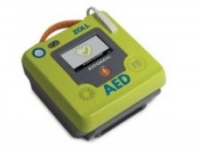Yet the HSE (Health, Safety and Environment) standards agency have little to say about it. Defibrillators are not included in a standard First Aid pack, yet they are one of the most important medical machines ever invented.
If someone suffers a cardiac arrest, their chances of survival drop dramatically the longer they are left untreated; when used between 3-7 minutes, a defibrillator increases these chances by up to 70%.
While numerous public places in the UK are equipped with AEDs, the workplace is a different story. It is not an HSE requirement to have one on the premises, but it is an invaluable device that could save someone's life.
If you're a business and looking to optimise the safety of your employees, here are four reasons why investing in a workplace defibrillator could be the best thing you ever did.
1. Save Lives
95% of patients who suffer a cardiac arrest die in the ambulance on the way to the hospital. The first few minutes after a cardiac arrest has taken place are the most crucial for determining chances of survival. If you administer a defibrillator on a patient within 3-5 minutes, you increase their chances of living by up to 70%. Whether you're a small business or an international corporation, investing in a defibrillator is an investment that could well save a human life.
2. Retain More Staff
Investing in safety precautions like defibrillators significantly increases your staff retention. Not only does it mean that your employees have enhanced defense should someone suffer a cardiac arrest, but your staff will be given a greater sense of security. In this way, investing in a defibrillator for your business shows that you care about your staff, and ensures that anyone who suffers a cardiac arrest is given optimum treatment to maximise survival time. It's also important to consider the effect of losing a colleague on your existing staff, and how this would impact their attitudes to working there.
3. Care for Visiting Customers
It's not only your employees who will benefit from the installation of a defibrillator; if you run a business where customers visit your premises, a defibrillator could save a valuable client's life. If one of your clients is unfortunate enough to experience a cardiac arrest in your workplace, knowing that you have a defibrillator on hand to help deal with the emergency will not only save their life but improve your credibility as a company.
4. Protect Share Prices
Work deaths aren't just horrendous affairs from a personal point of view, but also from a professional one. Fatalities in the workplace negatively impact your share prices, and also make you a less desirable employee for work-seekers. According to HSE, a work fatality costs the employer close to £3 million.
Ensuring you have a defibrillator on the premises reduces the chances of a staff member or customer dying, and therefore preserves your reputation as a trustworthy business associated with saving lives rather than being the setting for tragic accidents.
How to Use a Defibrillator
Defibrillators are designed for ease of use, and come with a set of instructions and often a step-by-step voice guide. You don't need to be medically trained or even have gone through a First Aid course in order to operate a defib. You can find expert AED defibrillator guidance, outlined by the British Heart Foundation (complete with video) - check out the BHF guide on how to use a defibrillator today, and maybe you could save someone's life.





